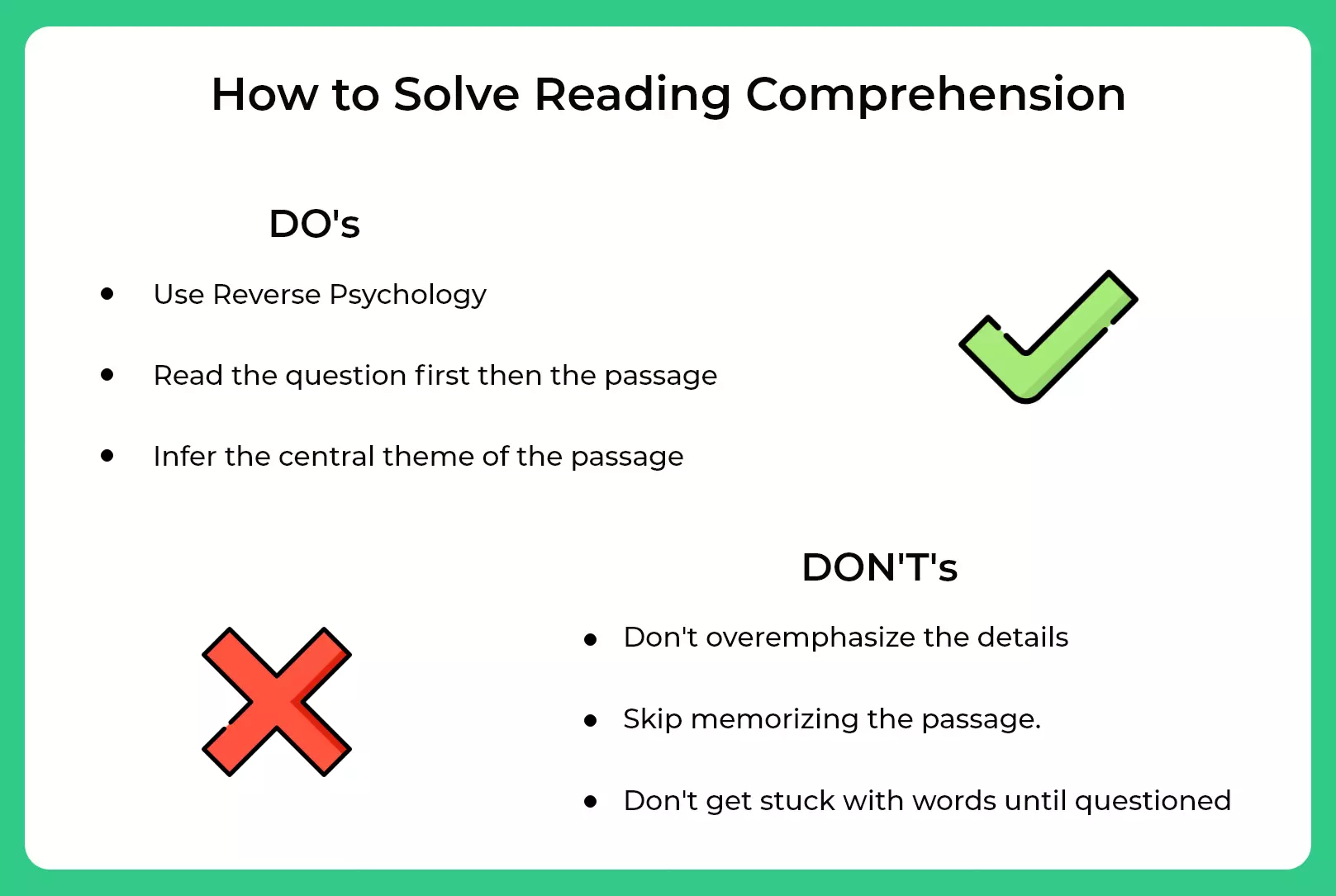How To Solve Reading Comprehension Questions Quickly
How To Solve Reading Comprehension
To understand How To Solve Reading Comprehension you first need to know what it actually requires to be done. So here we will see How To Solve Reading Comprehension Questions Quickly –
For attempting this kind of question a student must be well versed with words in case they get questions about inference, antonyms or synonyms. Vocabulary plays a big role while solving reading comprehension.

Why is Reading Comprehension important?
Reading comprehension is essential for many significant aspects of grammar and vocabulary, such as:
- Reading, understanding, and analyzing literature in your English classes
- Reading and understanding texts from your other class subjects, such as history, math, or science
- Understanding and engaging with current events presented in written form, such as news reports
- Properly understanding and responding to any and all other workplace correspondence, such as essays, reports, memos, and analyses
- Simply taking pleasure in written work in your own leisure time.
How To Solve Reading Comprehension Quickly
- Reverse Psychology:
Use reverse psychology and read the questions first. This will help you pay attention to the answer part rather than just wasting time on unnecessary things. - Grab the Main Idea:
Don’t waste time getting the details. Just get the main idea and move ahead. - Quit Memorizing:
Don’t memorize everything. Understand the flow and structure of the passage. You can always re-read the passage if needed. - Quit Over-Emphasizing Vocabulary:
Do not get stuck on particular words for meaning. Get the gist of the passage and save your time.
3 Steps to Improve Reading Comprehension
Step 1: Understand and Reevaluate How You’re Currently Reading
If your comprehension or concentration tends to lag after a period of time, start to slowly build up your stamina. For instance, if you continually lose focus at the 20- minute mark every time you read, acknowledge this and push yourself to slowly increase that time, rather than trying to sit and concentrate on reading for an hour or two at a stretch.
Step 2: Improve Your Vocabulary
Reading and comprehension rely on a combination of vocabulary, context, and the interaction of words. So you must be able to understand each moving piece before you can understand the text as a whole.
In order to retain your vocabulary knowledge, you must practice a combination of practiced memorization (like studying your flashcards) and make a point of using these new words in your verbal and written communication.
Step 3: Read for Pleasure
The best way to improve your reading comprehension level is through practice. And the best way to practice is to have fun with it!
Begin by reading texts that are slightly below your age and grade level. This will take the pressure off of you and allow you to relax and enjoy the story.
Prime Course Trailer
Related Banners
Get PrepInsta Prime & get Access to all 200+ courses offered by PrepInsta in One Subscription
Sample Questions - How To Solve Reading Comprehension
Passage 1
Philosophy of Education is a label applied to the study of the purpose, process, nature, and ideals of education. It can be considered a branch of both philosophy and education. Education can be defined as the teaching and learning of specific skills, and the imparting of knowledge, judgment, and wisdom, and is something broader than the societal institution of education we often speak of.
Many educationalists consider it a weak and woolly field, too far removed from the practical applications of the real world to be useful. But philosophers dating back to Plato and the Ancient Greeks have given the area much thought and emphasis, and there is little doubt that their work has helped shape the practice of education over the millennia.
Plato is the earliest important educational thinker, and education is an essential element in “The Republic” (his most important work on philosophy and political theory, written around 360 B.C.). In it, he advocates some rather extreme methods: removing children from their mothers’ care and raising them as wards of the state, and differentiating children suitable to the various castes, the highest receiving the most education, so that they could act as guardians of the city and care for the less able. He believed that education should be holistic, including facts, skills, physical discipline, music, and art. Plato believed that talent and intelligence are not distributed genetically and thus is be found in children born to all classes, although his proposed system of selective public education for an educated minority of the population does not really follow a democratic model.
Aristotle considered human nature, habit, and reason to be equally important forces to be cultivated in education, the ultimate aim of which should be to produce good and virtuous citizens. He proposed that teachers lead their students systematically, and that repetition be used as a key tool to develop good habits, unlike Socrates’ emphasis on questioning his listeners to bring out their own ideas. He emphasized the balancing of the theoretical and practical aspects of subjects taught, among which he explicitly mentions reading, writing, mathematics, music, physical education, literature, history, and a wide range of sciences, as well as play, which he also considered important.
During the Medieval period, the idea of Perennialism was first formulated by St. Thomas Aquinas in his work “De Magistro”. Perennialism holds that one should teach those things deemed to be of everlasting importance to all people everywhere, namely principles and reasoning, not just facts (which are apt to change over time), and that one should teach first about people, not machines or techniques. It was originally religious in nature, and it was only much later that a theory of secular perennialism developed.
During the Renaissance, the French skeptic Michel de Montaigne (1533 – 1592) was one of the first to critically look at education. Unusually for his time, Montaigne was willing to question the conventional wisdom of the period, calling into question the whole edifice of the educational system, and the implicit assumption that university-educated philosophers were necessarily wiser than uneducated farmworkers, for example.
Question 1:
What is the difference between the approaches of Socrates and Aristotle? –
1)Aristotle felt the need for repetition to develop good habits in students; Socrates felt that students need to be constantly questioned
2)Aristotle felt the need for rote-learning; Socrates emphasized dialogic learning
3)There was no difference
4)Aristotle emphasized the importance of paying attention to human nature; Socrates emphasized science
Answer:
The first option is correct – their approaches were different and this difference is quite explicitly explained in the fourth paragraph
Question 2:
Why do educationists consider philosophy a ‘weak and woolly’ field –
1)It is not practically applicable
2)Its theoretical concepts are easily understood
3)It is irrelevant for education
4)None of the above
Answer:
The first option is correct because educationists believe that philosophical abstractions are not suitable for practical application.
Question 3:
What do you understand by the term ‘Perennialism’, in the context of the given comprehension passage? –
1)It refers to something which is of ceaseless importance
2)It refers to something which is quite unnecessary
3)It refers to something which is abstract and theoretical
4) It refers to something which existed in the past and no longer exists now
Answer:
The first option is correct because the term comes from the root word ‘perennial’ which means ceaseless.
Question 4:
Were Plato’s beliefs about education democratic?
1)He believed that only the rich have the right to acquire education
2)Yes
3)He believed that only a select few are meant to attend schools
4) He believed that all pupils are not talented
Answer:
The second option is correct – Plato’s beliefs were democratic but not his suggested practices
Question 5:
Why did Aquinas propose a model of education that did not lay much emphasis on facts?
1)Facts are not important
2)Facts do not lead to holistic education
3)Facts change with the changing times
4)Facts are frozen in time
Answer:
The third option is correct – facts do change with the changing times, hence, they are not of the utmost importance when aiming for holistic education.
Passage 2
If a person suddenly encounters any terrible danger, the change of nature one undergoes is equally great. Sometimes fear numbs our senses. Like animals, one stands still, powerless to move a step in fright or to lift a hand in defense of our lives, and sometimes one is seized with panic, and again, act more like the inferior animals than rational beings.
On the other hand, frequently in cases of sudden extreme peril, which cannot be escaped by flight, and must be instantly faced, even the timidest men at once as if by a miracle, become possessed of the necessary courage, sharp, quick apprehension, and swift decision. This is a miracle very common in nature. Man and the inferior animals alike, when confronted with almost certain death ‘ gather resolution from despair’ but there can be no trace of so debilitating a feeling in the person fighting, or prepared to fight for dear life. At such times the mind is clearer than it has ever been; the nerves are steel, there is nothing felt but a wonderful strength and daring. Looking back at certain perilous moments in my own life, I remember them with a kind of joy, not that there was any joyful excitement then, but because they broadened my horizon, lifted me for a time above myself.
Read the above passage carefully and answer the questions given below:
Question 1:
Suggest a relevant title for the given passage:
- The Vision of Facing Danger
- A Fighting Will
- Changes in Nature
- Terror and Strength
Correct Answer: A
Explanation:
The essence of the paragraph can be best sensed in option A. Some of the lines in the first half of the passage give a clear gist of the same.
Question 2:
Sudden reactions to danger can be given by a man in three different ways. Name those ways?
- He might escape in fear, or combat, or do nothing.
- He may get a panic attack, paralyzed due to fear, or face the danger with courage by a miracle.
- He may seize due to fear, get paralyzed due to fear, or by miracle get the necessary courage to fight back danger.
- Runaway, fight and get paralyzed due to fear.
Correct Option: C
Explanation:
The paragraph above clearly defines the ways. “Sometimes fear numbs our senses…”
“Sometimes one is seized with panic….”
“Once if by a miracle, become possessed with necessary courage…”
Question 3:
“Gather resolution from danger” – What is the meaning of this phrase?
- Finding peace in times of distress
- Not losing hope and remaining calm
- Brave with the odds by being enthusiastic
- A time of extreme hopelessness making someone courageous to deal with difficulties
Correct Answer: D
Explanation:
From the word hint “resolution,” we can make out that this is the only option giving a precise meaning for the same.
Question 4:
Why the author of the passage feels content by the recollection of dangers as well as to overcome them?
- It was a new experience for him
- He felt proud and happy as he was still alive
- The experience lifted up his confidence and added a new perspective to his life
- He felt encouraged to do more tasks like this
Correct Option: C
Explanation:
The concluding lines of the passage clearly define the same. “Looking back at certain perilous moments in my own life… kind of joyful excitement… broadened my horizon… lifted me.”
Also Check Out
Get over 200+ course One Subscription
Courses like AI/ML, Cloud Computing, Ethical Hacking, C, C++, Java, Python, DSA (All Languages), Competitive Coding (All Languages), TCS, Infosys, Wipro, Amazon, DBMS, SQL and others
- Reading Comprehension – Questions | Rules | How to Solve Quickly | Tricks & Shortcuts
- Reading Comprehension –
Questions |
Rules |
How to Solve Quickly |
Tricks & Shortcuts






Login/Signup to comment